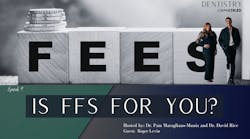Many philosophers have concluded that the most important commodity people have is time. You can’t buy more of it, and you can never recover it. How you choose to spend your time separates the truly efficient and successful business owners from the ones who flounder.
In my last article, I discussed the four keys that I’ve found to running and, more importantly, enjoying a solo fee-for-service (FFS) dental practice. These keys are a very thorough budget and goal-setting system; a rigorous CE regimen; a superstar staff that reflects your office philosophy; and a sincere interest in creating and enhancing relationships with your patients. It’s this last one that I believe is the cornerstone of a successful FFS practice.
Develop a sincere interest in your patients
Back in 1985, my model of what a general practice dentist looked like was my family dentist, Dr. Stanley Levy. He practiced stand-up two-handed dentistry. (Many of you younger dentists have no idea what that even means!) He had no assistant or hygienist and seemingly floated back and forth in his 800-square-foot two-operatory office.
He provided excellent dentistry while talking with his patients about current events and family ups and downs, dispensing equal measures wisdom and philosophy. He took a sincere interest in each patient, their circumstances, and their concerns.
When he retired and sold me his practice, this was my idea of how to continue his practice legacy. I could not have had a better mentor. During the last 39 years, I bore witness to the circle of life—treating the kids who are now married with kids of their own, sharing hugs for life’s milestones, and crying with patients during the tough times. I have so many stories about how sharing patients’ lives has made an impact on me, and I know that I’ve made a difference in their lives.
How patient relationships affect your practice
What does this have to do with dentistry and “fixing teeth”? It has everything to do with treatment plan acceptance, patient retention, and job satisfaction.
Let’s start with treatment plan acceptance. I’ve read many articles about how to get your patient to say “yes” to your proposed treatment, from patient education videos to patient personality analysis to finding their hot buttons. In my experience, it comes down to trust; if you’ve taken the time to establish a sincere connection, patients will be much more apt to believe you have their best interest at heart.
It doesn’t need to be over a long period of time. It starts with the initial phone call and every contact with your office. It continues with your initial exam and data gathering. Patients catch on very quickly as to whether you’re being thorough in order to create a unique master plan for their situation or simply checking boxes before you rush to the next operatory.
Spending time to create and nourish relationships with your patients can be some of the most valuable use of your time. When patients feel valued and appreciated, they’ll reward your investment with loyalty and a willingness to follow through on your prescribed treatment.
As for job satisfaction, getting to know my patients is a never-ending endeavor that continually surprises and delights me. I like to say that every day in my office is like hosting an open house; you get to see and catch up with old friends who are just as interested in your life as you are in theirs.
Running an FFS office can be stressful due to the lower patient volume. At times, I may have one- to two-hour holes in my schedule. I’ll talk in future articles about why this should not be stressful if you set goals and budget efficiently. For now, let me suggest that these open times are golden opportunities to enhance your relationships with your recall patients.
Instead of taking a two-minute spin around the mouth and running back to whatever procedure you were doing, spend five to 10 minutes with that recall patient (if your hygienist will let you!). You’ll be amazed at how appreciative your patient will be to have you take time out of your busy day to find out how they’re doing. I can almost guarantee that you’ll walk away feeling better for having made a deeper connection.
Most of the practice management articles I see these days have to do with bigger being better, how to sell to a corporation, how to create a multimillion-dollar practice, or how to create five or more offices in your area. I rarely see a piece extolling the virtues of a small solo practice.
It goes without saying that to have a successful FFS practice, you have to sincerely enjoy getting to know people. Most patients can tell if you’re faking interest. I recently heard a lecture about the speaker’s busy insurance-based practice, and he commented that seeing recall patients was the worst part of his day. He bragged about getting in and out of the room in less than two minutes.
If you’re in a busy insurance-dependent situation, and you’re running two chairs with three assistants, two to four hygienists, and three front desk personnel, it will be very hard to enjoy the kind of relationship-based practice I’m suggesting. Remember, creating relationships is just the first key in creating a successful solo FFS practice.
Next time I’ll talk about goal setting and budgeting, in short, how to run a business! That’s what makes dentistry so unique and fulfilling—providing excellent dentistry while creating relationships, but still running a business model.
How will you spend your time today? If you’re reading this in your office during a little down time, put down the magazine or close your laptop and see your next recall patient. Spend five to 10 minutes talking with them. I promise you it will be worth it!
Editor's note: This article appeared in the March 2024 print edition of Dental Economics magazine. Dentists in North America are eligible for a complimentary print subscription. Sign up here.
Robert Minch, DDS, is a graduate of University of Maryland Dental School and has enjoyed a fee-for-service practice in Baltimore, Maryland, for 39 years focusing on cosmetic and complete dentistry. He is a visiting faculty member at Spear Education and teaches Dental GPR residents at Johns Hopkins Hospital. Additionally, he has put together and created numerous study clubs. He can be reached at [email protected].








